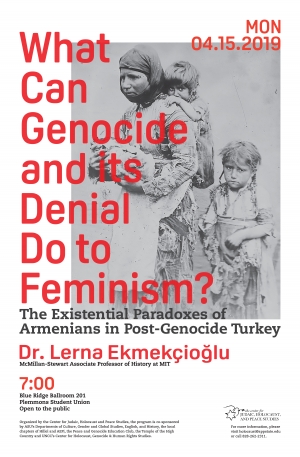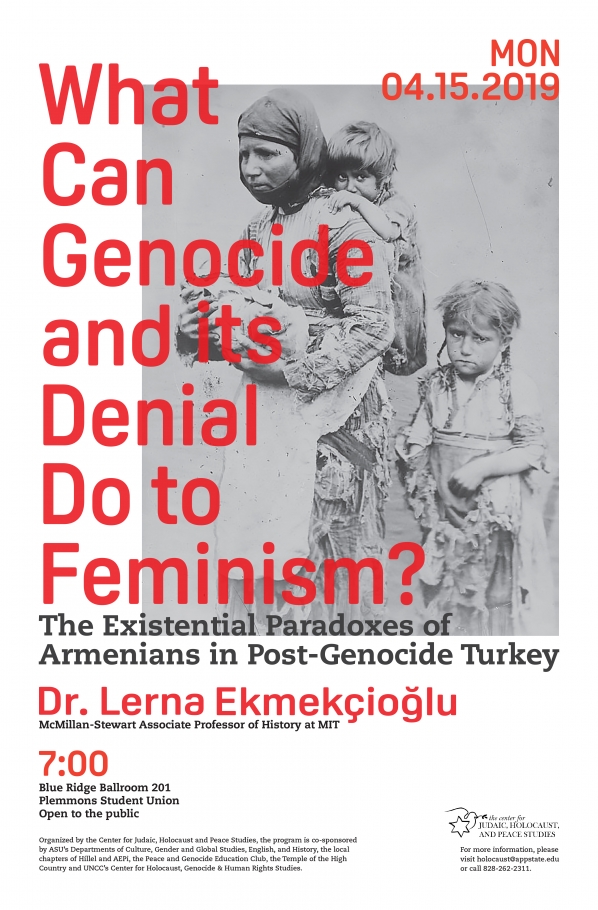Monday, April 15, 2019
7 p.m.
Blue Ridge Ballroom, Room 201, Plemmons Student Union
The evening lecture is free and open to the campus and community. RSVP is required for the luncheon - see details below.
The Appalachian and High Country communities are invited to a talk by Dr. Lerna Ekmekçioğlu, the McMillan-Stewart Associate Professor of History at the Massachusetts Institute of Technology (MIT) and a specialist in modern Turkish and Armenian history. The lecture on the past and present denial of the Armenian Genocide and struggles of Armenian survivors in post-genocide Turkey is entitled "What Can Genocide and its Denial Do to Feminism? The Existential Paradoxes of Armenians in Post-Genocide Turkey."
Ekmekçioğlu is a historian of the modern Middle East and an affiliate of the Women and Gender Studies Program as well as the Center for International Studies at MIT. She specializes on Turkish and Armenian lands in the 19th and 20th centuries. Her work focuses on minority-majority relationships and the ways in which gendered analytical lenses help us better understand coexistence and conflict, including genocide and post-genocide.
Ekmekçioğlu is the author of “Recovering Armenia: The Limits of Belonging in Post-Genocide Turkey,” which offers the first in-depth study of the aftermath of the 1915 Armenian Genocide and the Armenians who remained in Turkey. She also co-edited “Bir Adalet Feryadı, Osmanlı'dan Cumhuriyet'e Beş Ermeni Feminist Yazar (1862-1933) [A Cry for Justice: Five Armenian Feminist Writers from the Ottoman Empire to the Turkish Republic (1862-1933)],” which appeared in 2006. Currently, Ekmekcioglu is collaborating with Dr. Melissa Bilal in compiling a critical anthology of the history of Western Armenian feminism. In addition, she is working with Dr. Kent Schull (Binghamton, SUNY) on an edited volume on the entangled histories of Armenians in the 19th century Ottoman Empire.
Her work is also the focus of the Center for Judaic, Holocaust and Peace Studies (CJHPS)'s final lunch research colloquium. It will take place at the new conference location for the Center in Edwin Duncan Hall on Monday, April 15.
The evening lecture is free and open to the campus and community. RSVP is required for the luncheon. To RSVP or for more information on her visit, please contact the CJHPS at 828.262.2311 or holocaust@appstate.edu. With these events, the Center begins to mark this year's Genocide Awareness Month, which will be continued with the Holocaust Cantata on April 30.
This visit is organized by Appalachian’s Center for Judaic, Holocaust and Peace Studies, and co-sponsored by the Departments of Culture, Gender and Global Studies, English and History; the local chapters of Hillel and AEPi; the Peace and Genocide Education Club; the Temple of the High Country and UNCC's Center for Holocaust, Genocide and Human Rights Studies.
###
About the Center for Judaic, Holocaust and Peace Studies
Appalachian State University’s Center for Judaic, Holocaust, and Peace Studies was founded in 2002 to develop new educational opportunities for students, teachers and the community. Located administratively within the College of Arts and Sciences, the center seeks to strengthen tolerance, understanding and remembrance by increasing the knowledge of Jewish culture and history, teaching the history and meaning of the Holocaust, and utilizing these experiences to explore peaceful avenues for human improvement and the prevention of further genocides. The Center for Judaic, Holocaust, and Peace Studies is an associate institutional member of the Association of Jewish Studies, a member of the Association of Holocaust Organizations and a member of the North Carolina Consortium of Jewish Studies. Learn more at https://holocaust.appstate.edu.
About the Department of Cultural, Gender and Global Studies
The Department of Cultural, Gender and Global Studies offers degrees in global studies, interdisciplinary studies, and gender, women’s and sexuality studies. The department is also home to Watauga Residential College, an interdisciplinary, alternative general education program. The department promotes creative and imaginative engagement in cross-disciplinary investigation of complex systems and problems. Learn more at https://cgg.appstate.edu.
About the Department of English
The Department of English at Appalachian State University is committed to outstanding work in the classroom, the support and mentorship of students, and a dynamic engagement with culture, history, language, theory and literature. The department offers master’s degrees in English and rhetoric and composition, as well as undergraduate degrees in literary studies, film studies, creative writing, professional writing and English education. Learn more at https://english.appstate.edu.
About the Department of History
The Department of History offers a broad curriculum in local, national, regional and world history at both the undergraduate and graduate levels, which encourages history majors to develop a comprehensive approach to human problems. The study of history is an essential part of a liberal arts education and offers valuable preparation for many careers, such as law, journalism, public history, public service and business, as well as in teaching and the advanced discipline of history. Learn more at https://history.appstate.edu.

